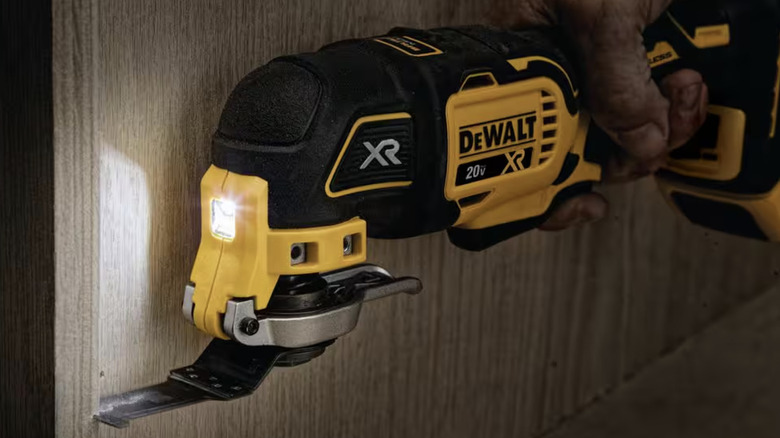DeWalt XR Vs Atomic: What's The Difference?
We may receive a commission on purchases made from links.
DeWalt is one of the most well-known and trustworthy tool companies on the market, along with Milwaukee, Makita, and a few others. Though known as a top-performing tool company that makes trade-specific tools, DeWalt also offers many affordable tools that belong in every homeowner's toolbox. However, within DeWalt's 20V system, you may have noticed that there are a few categories into which these tools and batteries are placed.
DeWalt 20V cordless power tools include the MAX, XR, and ATOMIC lines. The term MAX means that it can reach the maximum voltage of 20V — additionally, the battery is lithium-ion, and the tool is brushed. However, DeWalt has two upgraded lines attached to the MAX name, the ATOMIC, and XR, which stands for eXtreme Runtime. The two lines contain brushless motors, which require less long-term maintenance than brushed motor tools and also offer a bit more.
For example, XR has high-capacity lithium-ion batteries with extended runtime. That said, it's good to know the difference between DeWalt XR and ATOMIC so you can know for sure that you're getting the best DeWalt tool for your next project.
XR and ATOMIC: what's the difference?
Though DeWalt's XR line has power tools and batteries, when comparing the differences between XR and ATOMIC, we are only discussing power tools — ATOMIC is not featured on DeWalt batteries. That said, the two do have a couple of similarities other than their brushless motors. Right off the bat, they can be found within the same 20V system and are 100% compatible. For example, you can use an XR battery with an ATOMIC power tool. They are both also more compact than the standard MAX power tools.
So that begs the question of what exactly is the difference between these two DeWalt lines. Simply put, ATOMIC is smaller for users who have to work in tighter spaces or don't like power tools that take up too much room in their toolbox. If we compare the DeWalt ATOMIC 20V MAX 1/4-in. Impact Driver and the DeWalt 20V MAX XR 1/4-in. Impact Driver, there is an obvious difference in size — the ATOMIC version is much shorter.
Furthermore, the ATOMIC version is known to weigh a bit less than the XR tools. The ATOMIC impact driver is 2.1 pounds, while the XR version is 2.64 pounds. However, on DeWalt's website, they list the ATOMIC impact driver as 38.72 ounces (2.42 pounds), while the XR impact driver is 45.12 ounces (2.82 pounds). Either way, it is only a 0.4 to 0.5-pound difference, but those slight weight variations can make a world of difference when you're working with a power tool for an extended period.
Hands-on reviews of the XR and ATOMIC
Unlike the impact drivers mentioned above, some of the XR and ATOMIC versions of tools are nearly identical when placed side by side. However, there are several hands-on comparisons of tools to see which line works faster and cleaner than the other. Hammer and Home YouTube channel did a review of the DeWalt 20V MAX XR Oscillating Multi-Tool and the DeWalt ATOMIC 20V MAX Oscillating Multi-Tool. Holding the tools, there's not much of a difference other than the trigger section being a bit slimmer. Additionally, according to specs, the ATOMIC version weighs barely 0.1 ounces less at 2.33 pounds while the XR version is 2.4 pounds. However, it also has fewer oscillations per minute at 18,000 compared to the XR's 20,000 OPM.
In the multi-tool test, the reviewer uses the same wood blade and two fully charged 5 Ah batteries for each tool and places them side by side in front of a piece of wood to cut. In the first cut test, the ATOMIC moves barely half a second faster, even with less OPM. However, with each test, the difference is so minor that the reviewer couldn't determine if one is truly better than the other.
However, the YouTube channel ClientGraphics did a test between the previously mentioned impact drivers and the XR version was clearly faster than the ATOMIC at drawing a five-inch lag bolt out of a piece of wood. In all, though, it's up to you which version you feel will work best for your space and budget.


